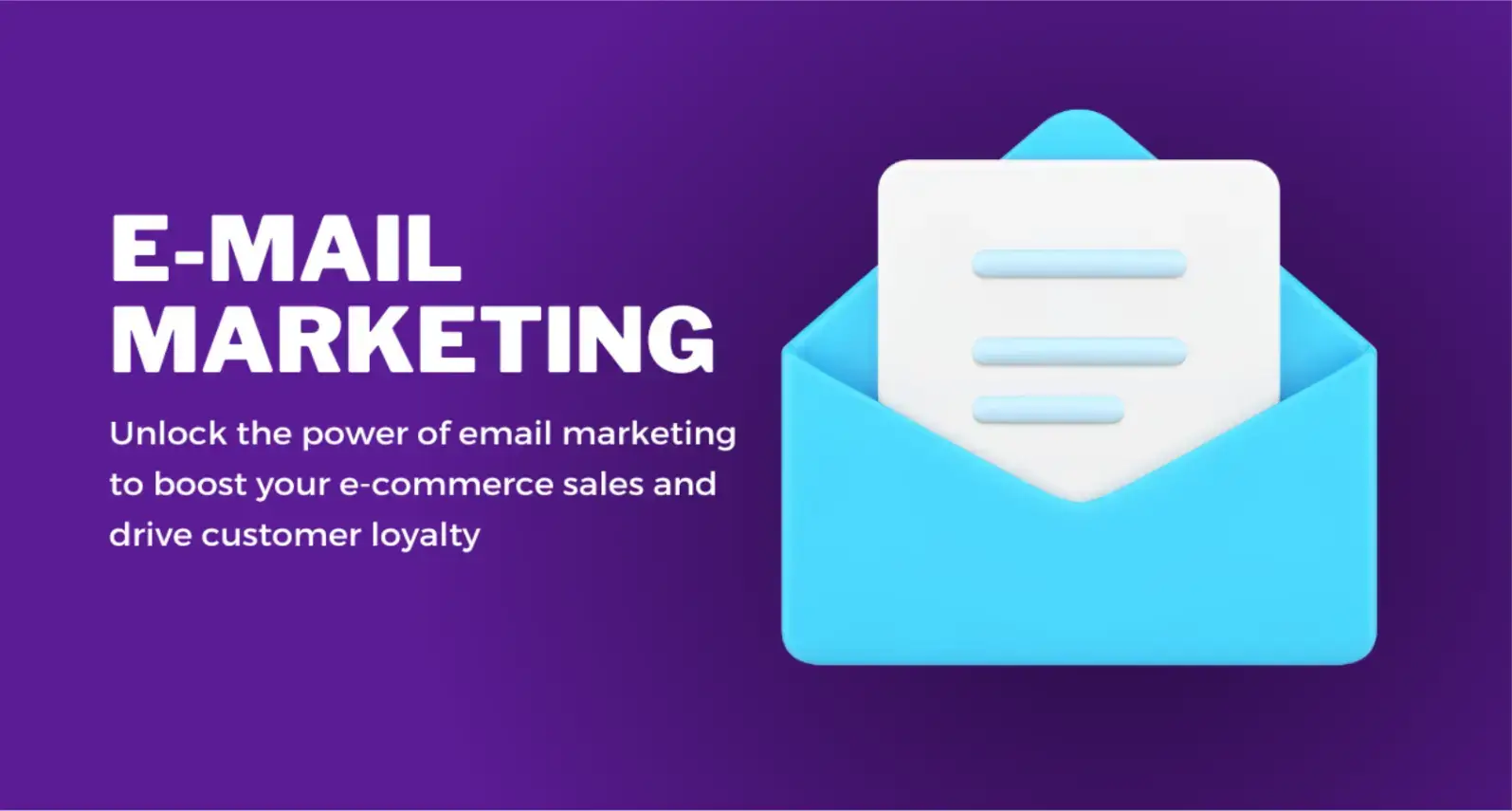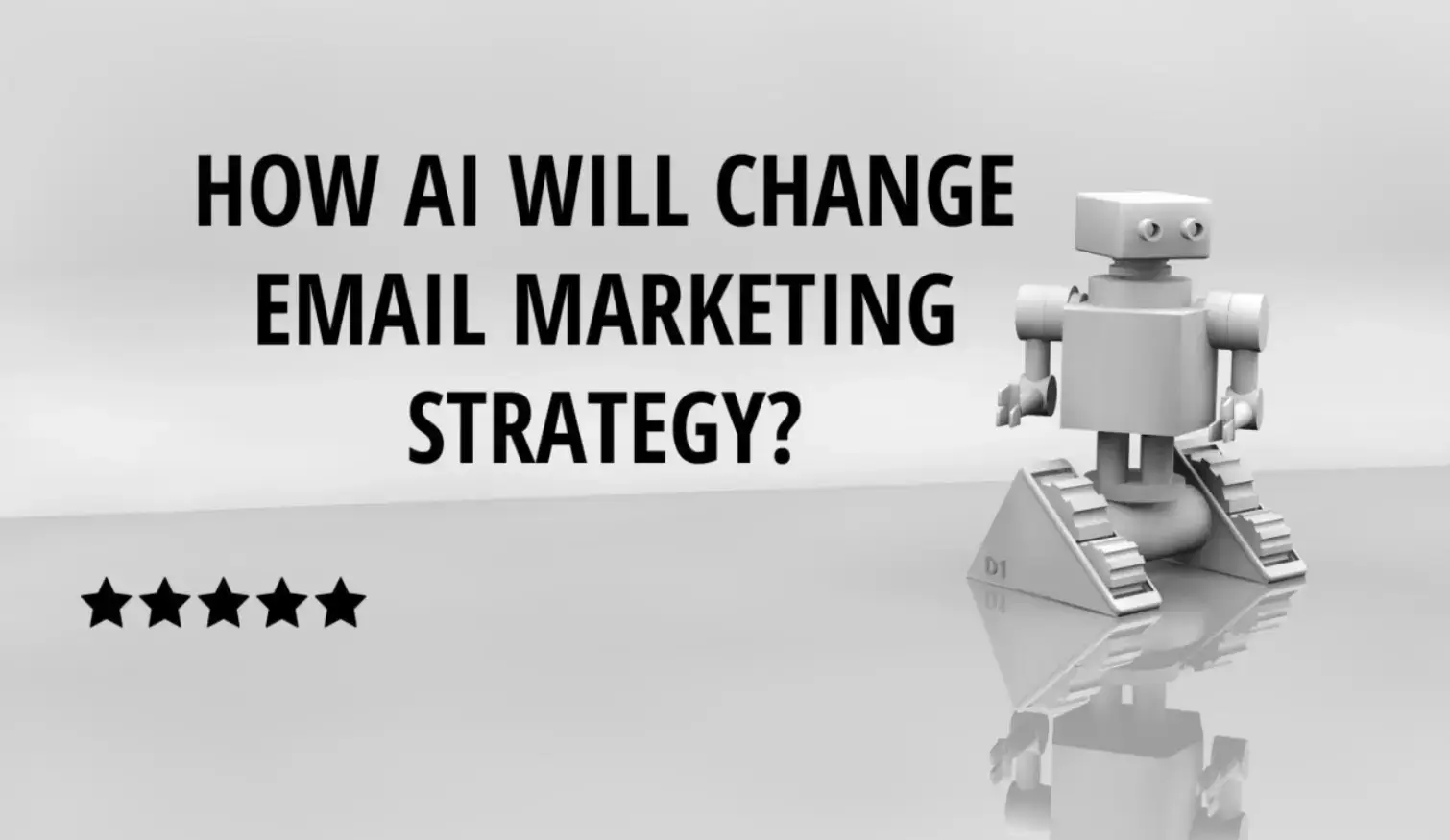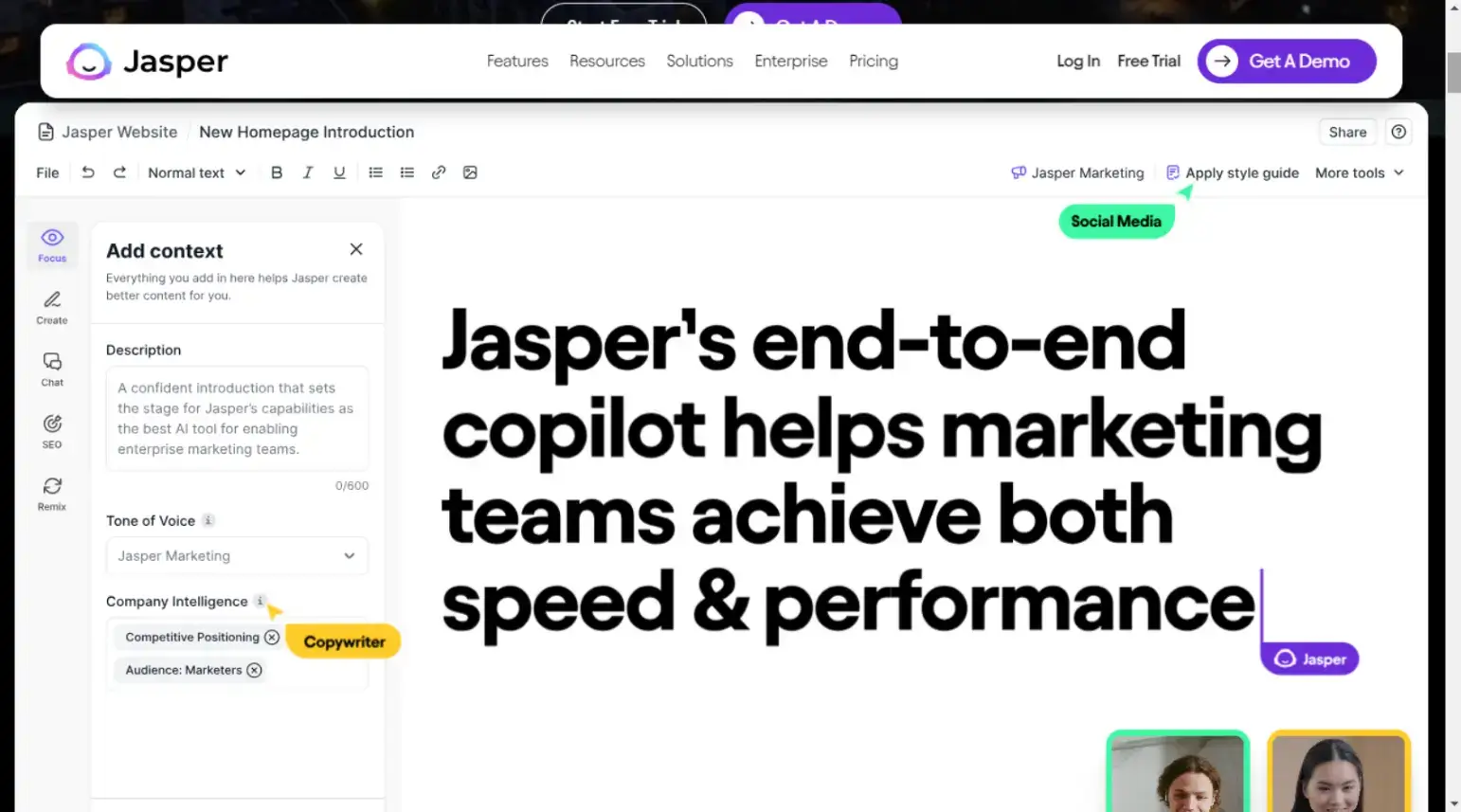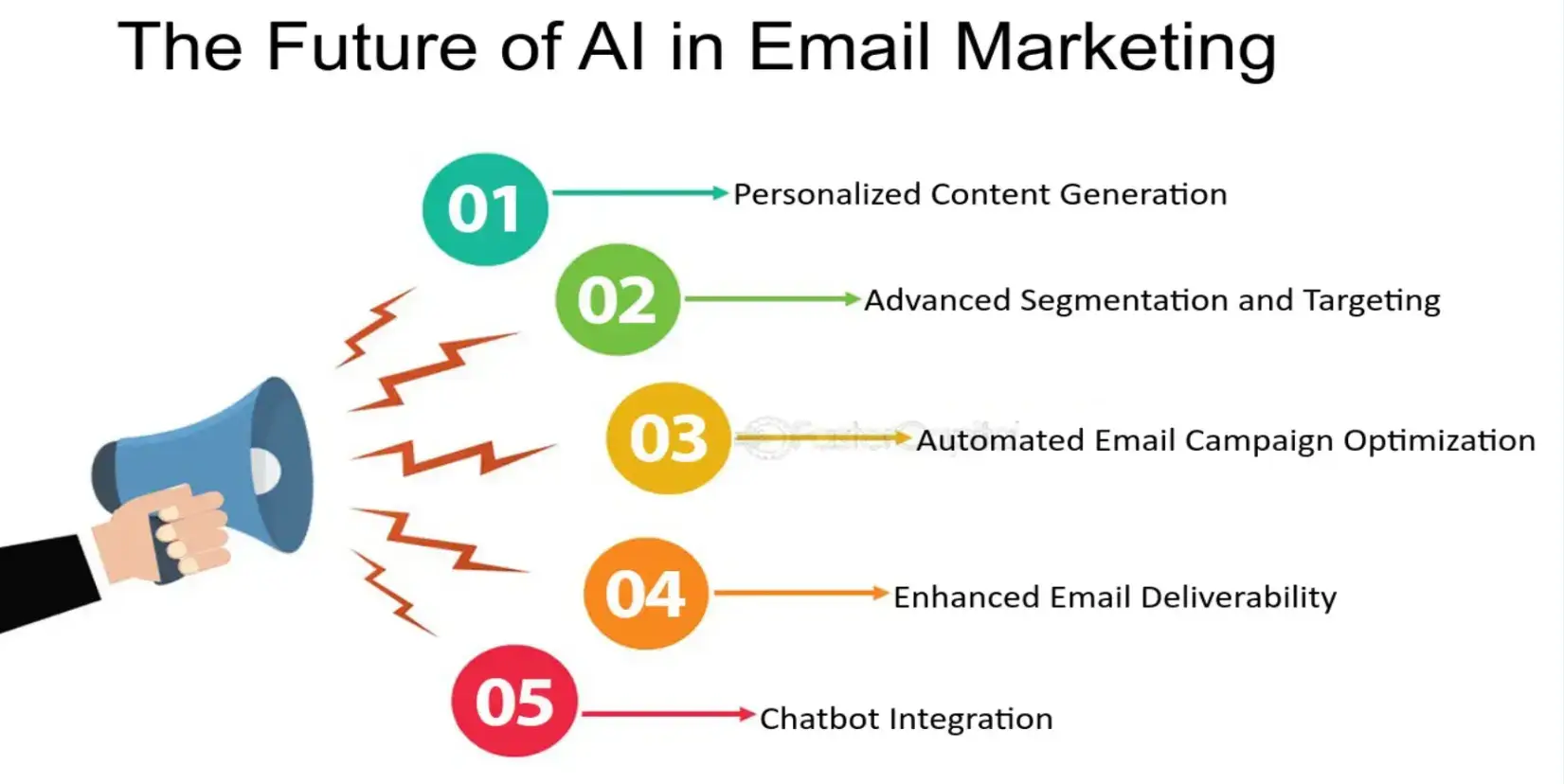Attracting today's consumers requires more than a catchy subject line in an era where Today's Artificial Intelligence (AI) is reshaping industries and promises to be the game-changer in email marketing.
Imagine having the power to personalize content for each of your subscribers, predict their behaviors, and engage them at the right moment. With AI, this is all possible and more!
Jump to:
- 7 Ways AI Can Transform Your Email Marketing Strategy
- Future Trends and Considerations
- Tips for Incorporating AI into Your Email Marketing

AI can tremendously improve your email marketing strategy, leading to higher open rates, increased conversions, and a superior subscriber experience.
This piece explores seven ways AI can transform your email marketing strategy, helping you to thrive in a competitive digital world. Stay with us to uncover these insights and get ready to revolutionize your email marketing approach.
Understanding AI in Email Marketing

Artificial Intelligence, or AI, in email marketing, uses data analytics and machine learning algorithms to improve and optimize your email campaigns.
It helps you understand your audience's behavior and automates tasks, enabling you to create more effective email marketing strategies.
The role of AI in email marketing is diverse and ever-expanding.
It can help personalize email content, predict the best time to send emails, segment your audience, and even craft subject lines that your subscribers will be unable to resist opening.
AI empowers you to deliver the right message to the right person at the right time. This can drastically improve your email open rates, click-through rates, and conversions.
Why Should You Adapt to Technological Advancements?
Adapting to technological advancements, especially in email marketing, is no longer an option but a necessity. Here are some compelling reasons to seize this opportunity now:
- Personalization: AI allows you to personalize email content based on your subscribers' behavior, preferences, and past interactions. For instance, you can use AI tools like Clay AI to send personalized recommendations to your subscribers, driving more engagement.
- Automation: AI enables you to automate repetitive tasks such as sending out welcome emails or birthday wishes, allowing you to focus on more strategic aspects of your digital marketing campaign.
- Timing: AI can predict the best time to send emails to each subscriber, maximizing open rates. For example, Starbucks uses AI to send personalized offers when customers are most likely to check their emails.
- Segmentation: AI allows for advanced audience segmentation. You can group your subscribers based on their behavior, engagement, and other parameters and send targeted emails that resonate with each group.
- Reduced Errors—Human error is inevitable in manual tasks. However, with the adoption of advanced technology, such errors can be significantly reduced, ensuring smoother operation for your email marketing campaigns.
- Analytics: AI can analyze vast amounts of data in real-time, delivering valuable insights to optimize your email marketing strategy. You can understand which strategies work and which don't and adapt accordingly.
7 Ways AI Can Transform Your Email Marketing Strategy
- Personalization through tailored content
- Automated email campaigns using AI-driven workflow
- Predictive analysis for precise audience targeting
- AI-driven A/B testing for optimizing subject lines and content
- Enhanced customer engagement through chatbots and AI interactions
- Dynamic content and individualized recommendations
- Spam and fraud detection

AI can enhance your email marketing strategy in many ways, but here are seven key aspects where its impact is most significant:
1. Personalization through tailored content
AI excels in creating content that feels tailor-made for each user.
AI can craft incredibly personal and relevant emails by analyzing a subscriber's past behaviors, interests, and interactions. This is not just about inserting a subscriber's name into an email.
AI can recommend products, offer insights, or share news that it has learned a particular user will appreciate.
For instance, Netflix uses AI to recommend shows or movies to its users based on their past viewing habits. This level of personalization makes the recipient feel understood and valued, increasing engagement and conversion rates.
Read more about cold email strategies.
2. Automated email campaigns using AI-driven workflow
AI-driven workflows can automate the entire email campaign process, making your life significantly easier. With AI, you can set conditions based on subscriber behavior that trigger specific email campaigns.
For example, when users abandon their shopping cart, an AI tool can automatically send an email reminding them to complete their purchase.
This automation reduces the manual task of tracking and responding to each customer action, freeing up your time for other strategic initiatives. It also ensures your customers receive timely responses, improving customer satisfaction and conversion rates.
3. Predictive analytics for precise audience targeting
AI's predictive analytics prowess can take your audience targeting to the next level.
By analyzing historical data and patterns, AI can predict future behaviors and email marketing trends, allowing you to target your audience more accurately.
You can customize your emails based on predicted customer preferences, engagement levels, or purchasing likelihood.
For example, retailers use AI to predict which customers are likely to purchase based on their browsing history and then send tailored offers to these customers.
This precision targeting can significantly increase conversion rates, making your email marketing campaign more effective and efficient.
4. AI-driven A/B testing for optimizing subject lines and content

AI improves your A/B testing capabilities, enhancing the effectiveness of your email marketing campaigns. You can test different subject lines, content, and layouts to see what resonates most with your audience.
AI, including AI tools like Google Analytics, analyzes the results and provides insights based on open rates and conversions.
AI can even suggest subject lines based on its learnings. The process is simple: The more data AI has, the better its recommendations will be. Using AI-powered A/B testing, you can ensure your emails are optimized to get the best results.
5. Enhanced customer engagement through chatbots and AI interactions
Chatbots and AI interactions lead to enhanced customer engagement in email marketing. The beauty of AI is that it’s available 24/7, providing immediate responses to customer inquiries without human intervention.
For instance, An AI tool like ChatGPT offers an AI-powered chatbot that can be integrated into email campaigns. This chatbot can answer FAQs, guide users through purchase decisions, or provide support, all within the email.
The result is a highly interactive, engaging, and efficient customer experience that drives brand loyalty and conversions.
6. Dynamic content and individualized recommendations

Source:Jasper
Unlike static content, dynamic content adjusts to each user, creating a unique and personalized experience.
AI analyzes user preferences, behaviors, and interactions, tailoring the content to meet individual needs.
This could mean showing each subscriber a different product, news, or offer based on their unique profile. This level of personalization keeps content fresh and relevant, increasing engagement rates.
A prime example is Amazon's recommendation system, which suggests products based on browsing history and previous purchases.
AI tools like Jasper AI or Wirestock's AI Art Generator specialize in creating dynamic content and individual recommendations, making them valuable additions to your email marketing toolbox.
It even comes with its own AI art generator called Jasper Art, which turns whatever you imagine into unique images for even more personalization!
7. Spam and fraud detection
AI provides a robust defense against spam and fraudulent emails. It can identify patterns and anomalies that might signal harmful content or phishing attempts, protecting your brand reputation and subscribers.
This not only increases subscriber trust but also improves the deliverability of your emails.
For example, using machine learning algorithms, Google removes more spam from Gmail with TensorFlow, helping users keep their email marketing efforts safe and effective.
Future Trends and Considerations
As AI grows and evolves, its impact on email marketing will only increase.
New advancements like natural language processing, voice recognition, and image generation open new opportunities for personalization and engagement.

Source: Faster Capital
However, as with any technology, there are also concerns about privacy and security. As a marketer, balancing leveraging AI while respecting customer privacy is crucial.
Additionally, the future of AI in email marketing will depend heavily on regulations and advancements in data protection laws.
As such, staying updated on any changes that could impact your email marketing strategy is essential.
Tips for Incorporating AI into Your Email Marketing
- Understand Your Audience: Before deploying AI in your email marketing, ensure you understand your audience. Know their preferences, behaviors, and needs. This will help you use AI more effectively to target and engage with your audience.
- Start Small: Don't attempt to overhaul your entire email campaign with AI simultaneously. Start small with AI-generated subject lines or content recommendations, then gradually incorporate more AI elements as you get comfortable with the technology and see positive results.
- Choose the Right AI Tool: Numerous AI tools are available for email marketing, each with strengths and specialties. Research and choose a tool that best fits your specific needs and goals.
- Use AI for Personalization: Leverage AI's ability to analyze and predict user behaviors to offer personalized content and recommendations. This not only improves engagement rates but also makes your audience feel valued.
- Stay Updated on AI Trends: As mentioned earlier, the world of AI is constantly evolving. Stay updated on new advancements and trends in the industry to ensure you are using the most effective tools and strategies.
- Don't Forget Human Touch: While AI can offer incredible benefits, don't forget the importance of the human touch in email marketing. Balance automation with genuine interactions to maintain a personal connection with your audience.
- Test and Analyze: As with any email marketing strategy, testing and analyzing the results is crucial. Continuously test different AI elements and analyze their impact on engagement and conversions to optimize your campaign's performance.
FAQs
1. How can I integrate AI into my email marketing strategy?
You can integrate AI into your strategy by using tools that offer AI-powered features such as personalization, A/B testing, and dynamic content creation.
You can also work with AI experts or consultants to develop a tailored approach for your business.
2. What are the benefits of using AI in email marketing?
AI has several benefits in email marketing, including increased efficiency and effectiveness, enhanced personalization and targeting, improved customer engagement and satisfaction, and better spam/fraud detection. It can also free up marketers' time to focus on other aspects of their strategy.
Ultimately, AI can help drive better results for your email marketing campaigns.
3. How does AI affect email marketing?
AI is revolutionizing email marketing by improving personalization, targeting, engagement rates, and efficiency. It also helps detect spam and fraud and offers valuable insights through data analysis.
However, it’s essential to balance the use of AI with ethical considerations and compliance with data protection laws.
4. How does AI improve email personalization?
By analyzing past user behaviors and preferences, AI enables businesses to customize their email messages to meet the specific needs of individual customers, thereby improving email personalization.
This can significantly improve engagement and conversion rates.
5. Can AI completely replace email marketing?
No, AI cannot completely replace email marketing. While AI can automate and enhance various aspects of email marketing, it still requires human input and creativity to be successful.
6. What are the implications of AI in future email marketing trends?
Future AI advancements in natural language processing, voice recognition, and image recognition will open new opportunities for personalization and engagement in email marketing.
However, marketers must also consider the potential privacy and security concerns and stay updated on data protection laws and regulations.
Takeaways
Artificial intelligence (AI) has profoundly transformed email marketing. It tailors the user experience through personalized content and recommendations, enhancing engagement and conversion rates.
The automation capabilities of AI streamline email campaigns, saving valuable time and ensuring timely responses to customer actions.
The predictive analytics AI provides allow for precise audience targeting and a more effective marketing strategy.
AI tools enhance A/B testing, providing crucial insights for optimizing content. Furthermore, AI chatbots enable immediate and interactive customer support, fostering customer engagement.
As AI continues to evolve, its influence on email marketing will undoubtedly expand, presenting new opportunities for personalization and engagement, albeit with necessary considerations for privacy and security.
Therefore, staying abreast of AI advancements and data protection regulations is vital for every modern email marketer.
Author Bio
Paul Aroloye is an SEO Specialist, AI Tools Expert, and YouTuber. You can contact him here.


